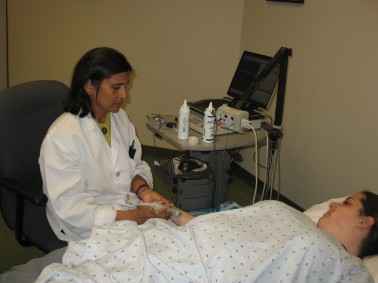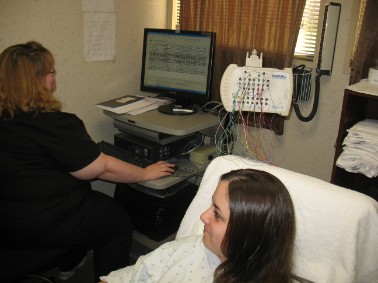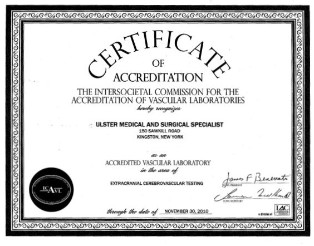|
||
Ulster Medical and Surgical Specialists provides multiple services such as MRI, EMG, EEG, and Carotid Ultrasounds. MRI is a way of getting pictures of various parts of your body without the use of x-rays, unlike regular x-ray pictures and CAT scans. A MRI scanner consists of a large and very strong magnet in which the patient lies. A radio wave antenna is used to send signals* to the body and then receive signals back. These returning signals are converted into pictures by a computer attached to the scanner. Pictures of almost any part of the body can be obtained at almost any particular angle. *These "radio wave signals" are actually a varying or changing magnetic field that is much weaker than the steady, strong magnetic field of the main magnet. MRI is quite safe in the majority of patients. Certain patients may not be able to have an MRI. These include people who get nervous in small spaces (claustrophobic) and those with implanted medical devices such as aneurysm clips in the brain, heart pacemakers and cochlear (inner ear) implants. Also, people with pieces of metal close to or in an important organ (such as the eye) may not be scanned. There are a few additional safety considerations and some exceptions based on individual circumstances. Also, certain metal objects that we commonly have on our persons like watches, credit cards, hair pins, writing pens, etc. may be damaged by the MRI scanner or may be pulled away from our bodies if we go into an MRI room. Also, metal can sometimes cause poor pictures if it is close to the part being scanned. For these reasons, patients are asked to remove these objects before entering the MRI scanner. You will most likely be lying on a special metal table that moves into the center of the magnet. Prior to going into the magnet you will be offered earplugs to reduce the noise that you hear. You will then hear some "hammering" noises while the scanner is preparing for scanning and taking the pictures. During this hammering noise, it is important not to move, as this would blur the pictures. You will also feel some vibration during the hammering noise and some slight movement of the table during the examination. Some patients will be given an injection in their arm of a substance that improves certain types of pictures. This substance called a "contrast agent" is very safe and is unrelated to the iodine used for CAT scans and kidney x-rays.
Electromyography and Nerve Conduction Studies (EMG/NCS) Your doctor has requested an electromyography and nerve conduction study. This tests the activity of nerves and muscles. Plan approximately one hour for the test. A specially trained neurologist will perform your test. During the nerve conduction study (NCS) electrodes will be put on the skin with cream. When the exam is done, the electrodes and cream are easily removed. The electromyography will then be performed by placing a fine disposable needle electrode into individual muscles to record their activity. No electrical stimulation is used for the needle testing. Most people experience mild discomfort with these tests. If you are on medications that affect your driving, please have someone bring you to the test and have someone bring you home. Please inform the office prior to testing if you are on blood thinners (coumadin) or have a pacemaker. Please do not use creams or lotions on the day of the test. Your test results will be sent to your doctor to review and discuss with you. NOTE: No children will be allowed in the EMG lab during the procedures.
Electroencephalogram: An EEG helps the physician diagnose certain conditions of the brain. The physician must interpret the results of the examination in order to correctly diagnose any condition. An EEG determines the activity level in the brain by the use of electrodes attached to the scalp. PREPARATION: ~On the day of the EEG, bring with you a list of all the medications that you are currently taking. ~You should take your medications as per usual instruction. ~You should wash your hair thoroughly the night prior to the exam; the scalp must be thoroughly absent from hairspray, gels, or any other chemicals. ~Bring a scarf, especially in cold weather, since the hair will become damp from the gel. ~You may also want to bring a comb and/or brush. ~You should eat a light meal at least 1-2 hours prior to exam. ~You should avoid caffeine (coffee, tea, soda). PROCEDURE (SPECIAL TESTS): Sleep deprived-(whether adult or child)- sleep from the night before until 4:30 A.M.-then stay awake until the exam. eat a light meal 1-2 hours prior to exam Sleep with sedation-(if the doctor requests it)- all prescriptions are to be filled prior to the date of examination and brought with you to be taken immediately preceeding the examination. AFTERWARDS: ~You should be able to reume normal activities immediately. ~You will need to wash your hair.
Carotid Ultrasounds: CUS is a test used to determine whether or not there is a blockage or a narrowing in your carotid arteries. It is a noninvasive test that is performed in about 30 minutes and there are no side effects. |
(Example of a brain MRI) 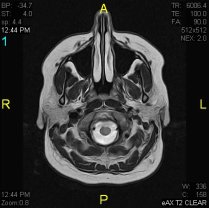
(Example of brain MRA) 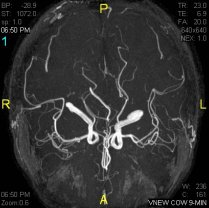
|
|
